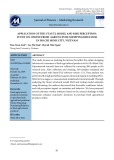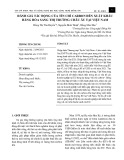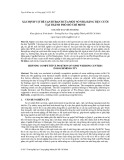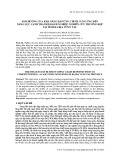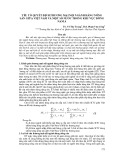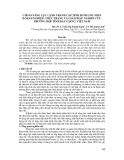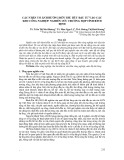
BRIBERY, CREDIT ACCESS, BARGAINING POWER
AND MARKET COMPETITION: EVIDENCE FROM
CROSS-COUNTRY FIRM-LEVEL DATA
HÀNH VI HỐI LỘ, TIẾP CẬN TÍN DỤNG, SỨC MẠNH ĐÀM PHÁN
CỦA DOANH NGHIỆP VÀ SỨC ÉP CẠNH TRANH
TRÊN THỊ TRƯỜNG: BẰNG CHỨNG TỪ SỐ LIỆU
DOANH NGHIỆP ĐA QUỐC GIA
Dr. Le Thanh Ha; Dao Hanh Le; Nguyen Ngoc Mai
National Economics University
lethanhha@neu.edu.vn
Abstract
This paper used the multi-country firm-level data covering 104 countries for the period
from 2010 to 2019 to investigate the effects of bribery on credit access for firms holding bargain-
ing power and/or facing market competition. We used firms’ size and legal status to capture their
bargaining power, while the levels of market competition were analyzed according to the number
of competitors in the same working field. Our empirical results provided evidence to support the
“greasing-the-wheels-of-credit access” hypothesis. Furthermore, the effects of bribery become
stronger for larger-sized or formally-registered firms, and those facing no market competition.
These effects also become pronounced if we controlled the endogeneity problem.
Keywords: Bribery, Credit Access, Bargaining Power, Market Competition, Cross-country
Firm-level.
Tóm tắt
Nghiên cứu này sử dụng dữ liệu doanh nghiệp đa quốc gia, bao gồm 104 quốc gia trong
giai đoạn từ 2010 tới 2019 để nghiên cứu tác động của hành vi đút lót tới việc tiếp cận tài chính
của doanh nghiệp sở hữu sức mạnh đàm phán và/hoặc hoạt động trên thị trường có nhiều cạnh
tranh. Chúng tôi sử dụng kích thước doanh nghiệp và trạng thái pháp lý để ghi nhận sức mạnh
đàm phán của doanh nghiệp, trong khi chúng tôi sử dụng thông tin về số lượng đối thủ cạnh
tranh trên cùng lĩnh vực để đánh giá mức độ cạnh tranh trên thị trường mà doanh nghiệp hoạt
động. Kết quả thực nghiệm chỉ ra bằng chứng ủng hộ giả thuyết bôi trơn để được tiếp cận các
nguồn tài chính, tín dụng. Ngoài ra, tác động của hành vi đút lót trở nên mạnh hơn đối với
doanh nghiệp có quy mô lớn hoặc doanh nghiệp đăng ký kinh doanh chính thức, hoặc doanh
nghiệp không bị sức ép cạnh tranh quá lớn. Tác động cũng trở nên mạnh hơn khi cúng tôi kiểm
soát vấn đề nội sinh.
Từ khóa: Hối lộ, tiếp cận tín dụng, sức mạnh đàm phán của doanh nghiệp, cạnh tranh
trên thị trường 1.
1. Introduction
Undoubtedly, a capital plays an essential role for firms in contributing to the sustainable
7
INTERNATIONAL CONFERENCE FOR YOUNG RESEARCHERS IN ECONOMICS & BUSINESS 2020
ICYREB 2020

growth and efficiency in firms’ operation activities, along with labors and technology (Aghion
and Howitt, 2007). In addition to equity capital, firms use debt capital such as bank credit for
their business activities. Accordingly, the access conditions to bank credit are important for the
survival and development of both small-medium sized (SMEs) and large firms (Levine et al.,
2000). Specifically, the micro and small firms make up for a large proportion of the developing
economy (De Mel et al., 2009; Nichter and Goldmark, 2009) and financial constraints are con-
sidered as a major obstacle for their daily business operations (Ayyagari et al., 2008; Beck and
Demirguc-Kunt, 2008). However, the rigid financial system can create lots of challenges for
firm to meets the conditions of financial institutions to issue the loans (Liu et al., 2020). Under
this circumstance, firms may experience inefficient resource allocations and show the poor per-
formance.
In many countries, the government interferes in the economy by laws or regulations, there-
fore, the quality of institutional environment not only plays an important role in credit market
but also affect firms’ credit registrations (Galli et al., 2017). A great deal of papers studies the de-
terminants of the quality of institutional environment such as performance in practicing laws (La
Porta et al., 1997; Djankov et al., 2008). Firms may face difficulties to satisfy the requirements
stemming from legal regulations requested by the government. Under this circumstance, paying
bribes, with hardly any other choice is considered as a strategic behavior that allows firms to
avoid the constraints from both the governments and banks (Zhou and Peng, 2012). Since bribery
often happens in countries where the government involves in the economy (Klitgaard, 1988) or
public servants possess low wages (Kraay and Van Rijckeghem, 1995), bribery can be served as
a powerful tool for firms to help them to connect with public officials, then control their private
benefits (Martin et al., 2007).
In the literature, prior scholars have investigated the association between bribery and credit
access. For example, Fungacova et al. (2015) provided empirical results that bribery has signif-
icantly positive impacts on total firms’ bank debt in the short-term but negative impact in the
long-term. Şeker and Yang (2014) claim that making informal payments such as bribery may cre-
ate bigger burdens on the development of SMEs. Along with lending process, corruption can
occur when firms bribe bank officials to achieving loans (Beck et al., 2006). In this spirit, bribing
amount is seen as tax on firms, causing a barrier to get credit. In the same vein, Qi and Ongena
(2018) and Wellalage and Locke (2019) indicates that bribery is detrimental for firms in accessing
the credit. In contrast, some scholars have provided empirical results that bribery has a positive
impact on firms’ chance of getting credit (Weill, 2011; Chen et al., 2013). It can be seen that find-
ings of pre-existing papers have not consolidated about whether bribery has a positive or negative
impact on firm’s credit access.
Our paper also examines the relationship between bribery and firms’ credit access but crit-
ically aims at closing the gap in the literature by two dimensions. First, we scrutinize to provide
an apparent conclusion on the effects of bribery on firms’ credit access by using the cross-country
firm level data as opposed to the empirical evidence in a typical country provided by previous
studies. Second, we contribute to the literature by providing an argument that the impacts of
bribery on credit access are conditional on firms’ bargaining power and level of market compe-
tition. Put it differently, the effects of bribery are various among different situations. In terms of
8
INTERNATIONAL CONFERENCE FOR YOUNG RESEARCHERS IN ECONOMICS & BUSINESS 2020
ICYREB 2020

bargaining power, in accordance with the analysis by Nguyen et al. (2020), we assume that a
firm’s bargaining power is shaped by its competency and substitutes to bribes. Correspondingly,
firms’ size and legality are applied to capture their bargaining power. Zhou and Peng (2012) de-
bated that firms with weak bargaining power need to pay bribes for their survival, whilst firms
with stronger bargaining power are more likely to achieve more benefits from their paid bribes
(Rose-Ackerman, 1978). Based on this discussion, we formulate our hypothesis about effect of
bribery on firm credit access under the moderation of firms’ bargaining power. In the aspect of
level of market competition, it is believed that higher level of market competition leads to fewer
benefits in firms’ paying bribes (Malesky et al., 2020). Under this circumstance, firms need to
pay a higher amount of bribery in order to keep in touch with officials (Rose-Ackerman, 1978;
Diably and Sylwester, 2015) and pay higher extra charges due to the less predictable environment
(Malesky et al., 2020). In reference to this discussion, we develop our hypothesis about moder-
ating effect of levels of market competition over the relationship between bribery and firms’ credit
accessibility.
In the present article, we employed a probit method for the firm-level cross-country data
including 104 countries during the 2010-2019 period to examine the effects of bribery on firms’
credit access and our proposed hypotheses, which contemplates the moderating effects of firms’
bargaining power and the levels of market competition. We measured the bribery as the percentage
of annual sales paid as informal payment to public officials, and generated dummy variable to
twig the extent of bribery. In addition, we categorized firms by size as SMEs and large-sized
firms based on the definition of World Bank Enterprise Survey. Dummy variable for firms’ legal
status was also created. The levels of market competition were analyzed according to the number
of competitors in the same working field. As mentioned in the literature, since there might be re-
verse causality between bribery and credit accessibility, the bribery variable may be endogenous
and lead to biased estimation results. Hence, we applied the instrumental variable (IV) method
to address this endogeneity problem.
To our best knowledge, our paper is the first to scrutinize the relationship between bribery
and firms’ credit accessibility under the moderation of firms’ bargaining power and levels of mar-
ket competition. The results of our benchmark model pointed out evidence to reinforce our hy-
pothesis that firms’ bribery of public officials is positively related with firms’ credit access. Also,
the estimation results of sub-sample by size and by legality also suggested that the effect of bribery
is more sizable for larger-sized firms or formally-registered firms. The estimation results sub-
sample by market competition demonstrate that the market competition negatively moderates the
association between bribery and firms’ credit access. Lastly, the effect of bribery becomes stronger
under the management for the endogeneity issue.
The remainder of the paper is illustrated according to the following organizations. Related
studies and hypothesis development are discussed in Section 2. Section 3 illustrates the data used
in this paper. Section 4 performs the development of a model for enterprises at the cross-country
firm-level data to determine a myriad of factors influencing firms’ credit accessibility. The em-
pirical results are reported in Section 5. The conclusions and policy implications are provided in
Section 6.
9
INTERNATIONAL CONFERENCE FOR YOUNG RESEARCHERS IN ECONOMICS & BUSINESS 2020
ICYREB 2020

2. Theoretical background and hypothesis development
2.1. Bribery and firm credit access
Bribery of public officials is more likely to happen in countries where there are govern-
ment’s interventions in economy in terms of licenses or restrictions, which turns out to enhance
the power of public officials in practicing regulations (Klitgaard, 1988). In addition, the rigid fi-
nancial system can create lots of challenges for firm to meets the conditions of financial institu-
tions to issue the loans (Liu et al., 2020). Under this circumstance, these firms need to select a
strategic behavior to maintain the relationship with official in order to overcome these difficulties.
As argued by Cai et al. (2011), bribery allow firms to obtain this goal. In this article, we expect
that paying bribes increases firms’ accessibility to credit. There are plausible reasons to explain
our belief.
First, the government acts as a tangible hand in helping financial institutions to reduce
problems about corporate moral hazard (La Porta et al., 2002; Faccio et al., 2006); thus, has strong
impact on banks’ loans. As a result, firms can use distortive behaviors such as bribery to provoke
public officials to abuse their reputations and authorities to control privately beneficial effects
(Martin et al., 2007). For example, firms use bribery of public officials to take advantage over
their competitors to obtain government contracts or be in governmental support programs as an
award from the public officials for paying the highest bribery (Beck and Maher, 1986; Martin et
al., 2007). This discussion implies that bribery can be served for buying judicial decisions or
eliminating barriers that prevent firms from accessing to credit (Rose-Ackerman, 1998).
Second, the red tape of financial institutions increases due to information asymmetry, which
may lead to credit allocation inefficiency and higher transaction costs (Liu et al., 2020). Paying
bribes can help firms to decrease the consequences of red tape and improve the likelihood of ob-
taining bank loans (Fungacova et al., 2015). Additionally, Lui (1985) and Levine et al. (2000)
contend that the rigidity of financial system can be softened, the cumbersome credit procedures
can be simplified, the loan approval waiting time can be reduced for firms that accept to pay
bribes.
On the contrary, some scholars argue that bribery may be an obstacle in accessibility to
credit of enterprises. It is illustrated that bank officers due to asymmetric information in lending
process, bank officers often have permissions in determining credit terms like collateral types or
interest rates (Barth et al., 2009), which leads to bribe from firms to break the barriers or avoid
difficult terms and motivates officers to make up sophisticated credit terms to achieve more
bribery (Guriev, 2004). This may lead to the fact that the number of non-performing loans in-
creases due to firms’ bankrupt and reduce banks’ willingness to lend, which prevent firms from
getting credit from banks. Additionally, banks’ severe credit terms to avoid default such as high
interest rates make it harder for firm to get credit because of higher borrowing costs and more fi-
nancial constraints (Beck et al., 2006; Firth et al., 2009), preventing low-risk borrowers, but en-
couraging higher-risk borrowers to borrow and raising the risk of debt recovery. Hence, it is
tougher for firms to access to credit.
Overall, it is likely that bribery reduces credit constraints and helps firms obtain bank loans
10
INTERNATIONAL CONFERENCE FOR YOUNG RESEARCHERS IN ECONOMICS & BUSINESS 2020
ICYREB 2020

whereas the relationship between banks and firms is promoted by corruption. Accordingly, we
propose the following hypothesis:
H1: Firms’ bribery of public officials is positively associated with firm credit access.
2.2. Moderating Effects of Bargaining Power
Prior scholars such as Bliss and Tella (1997) and Fisman and Svensson (2007) contend that
the bargaining power of firms determine the effects of bribery. In the similar spirit, we also argue
that firms’ bargaining power influence their ability to reduce the payment amount and negotiate
for better benefit (Rose-Ackerman, 1978), therefore moderate the association between bribery
and credit access. In this paper, we employ firms’ size and legal status (formal and informal reg-
istration) to capture their bargaining power vis-à-vis public officials.
2.3. Firm size and benefit of bribes
As discussed by Rose-Ackerman (1978), the larger-sized firms are more likely to earn more
benefit from their paid bribes. That is due to the fact that the local government prefers the large-
sized firms since these firms with stronger financial and technical capacities tend to create more
jobs and have more tax contributions. Furthermore, the large-sized firms have closed connections
with political agents (Zhou and Peng, 2012), thus reduce the probability of paying “extortion”
bribes and enhance the likelihood of accessing to more “lucrative business opportunities” (Nguyen
et al., 2017). Hence, firms with a larger size are more likely to engage in benefit-seeking bribes
and receive more preferential treatments. The more preferential treatments may help these firms
to overcome the cumbersome credit procedures and reduce the loan approval waiting. Moreover,
Wellalage et al. (2019) also reveal that the larger-size firms may be able to avoid the “loop-holes”
and find an alternative way to address cumbersome situations. Moreover, transactional techniques
based on verifiable hard information and more privilege lending relationships with larger and
more transparent firms are more likely to be applied by large banks (Stein, 2002). Specifically,
the firm size can impact the probability of bankruptcy since they are more diversified and harder
to fail (Honhyan, 2009). That implies that they would have more opportunities to raise capital.
Therefore, the firm size moderates the association between bribery and credit access. We hypoth-
esize:
H2: The effect of bribery on firm credit access is greater for large-sized firms.
2.4. Firm legality and benefit of bribes
Informal (or unregistered) firms are seen potentially as productive as formal (or registered)
firms. However, unregistered firms are believed to face constraints such as lack of access to
formal loans or public services (Farazi, 2014), which prevents them from growing up (De Soto,
1989, 2000). Informal firms are likely to avoid taxes, however, have fewer chances to get access
to formal loans or access to framework of legal protection supported by the government (Aureo
de Paula and Scheinkman, 2007) or even government finance support due to institutional con-
straints (Rothenberf et al., 2016). In this article, there are several reasons to make us believe that
informal firms have very low bargaining power.
First, since informal firms are usually recognized as very small firms (Farazi, 2014; Rothen-
berf et al., 2016), they have lower bargaining power. Therefore, they earn fewer benefits from
11
INTERNATIONAL CONFERENCE FOR YOUNG RESEARCHERS IN ECONOMICS & BUSINESS 2020
ICYREB 2020



